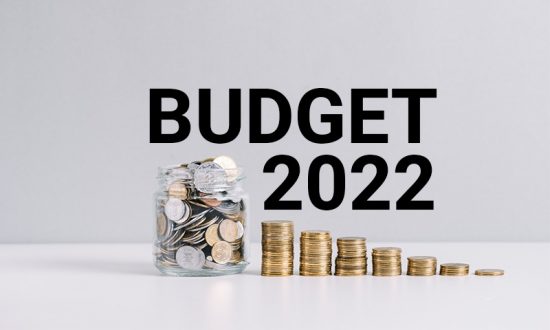Once again, with the red-sleeved national emblem embossed tablet, the finance minister, miss Nirmala Sitharaman shared the paperless budget for the year 2022-2023, stating that this will be the blueprint for the next 25 years as we anticipate the hundredth year of India’s freedom.
The new budget includes renovations in the digital framework of the nation focusing on increasing the accessibility of these services for rural areas with advanced Fiji connectivity required spectrum auctions this year will help to facilitate the roll-out of LG mobile services by private telecom players.
While techxperts figure out how the RBI going to fare in the cryptocurrency game or how e-passports are going to become a reality, let us look at some prominent leaders in the industry who react to the Union Budget 2022.
Rajeev Agarwal – CEO & Founder, Innoviti Payment Solutions
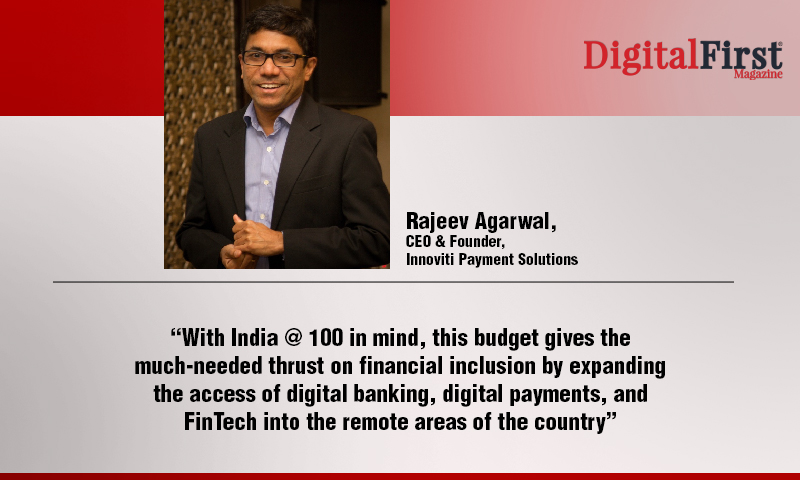
The Union Budget 2022 echoes that this year will be an exciting one for the Indian FinTech industry with the government continuing to play a supporting role.
With India @ 100 in mind, this budget gives the much-needed thrust on financial inclusion by expanding the access of digital banking, digital payments, and FinTech into the remote areas of the country. Initiatives such as bringing all post office banks under the core banking umbrella while setting up 75 digital banking units in 75 districts of the country are a welcome move that will take India forward.
Digital Rupee will further decrease friction in the movement of money, reducing the cost of money and in the long-term contribute to fuelling economic growth.
The budget gives a boost to the overall fintech ecosystem, especially to the start-ups in FinTech sector who are working towards making digital payments safer and more frictionless than before.
Pulkit Sharma, Co-Founder and Ceo, Khabri
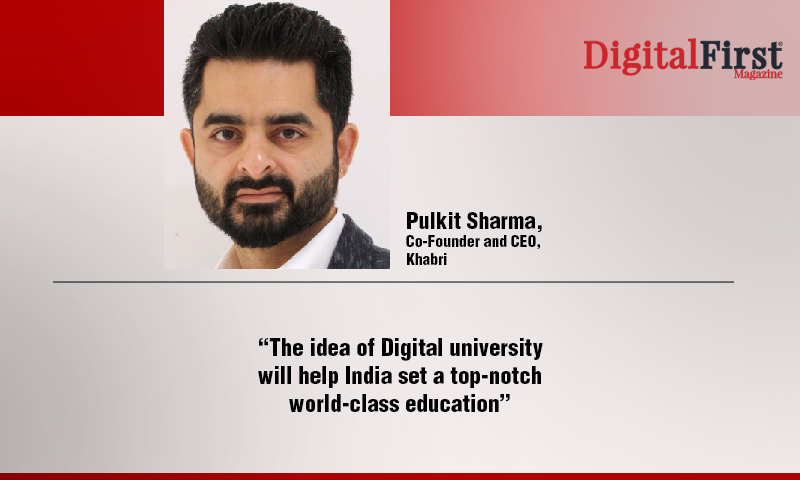
We highly support our government’s decision of the Production Linked Incentive Scheme that will create 60 lakh new jobs in the next 5 years. The idea of Digital university will help India set a top-notch world-class education. We believe that knowledge and awareness will support India becoming Atmanirbhar and through the expansion of the One class, one TV channel’ program of PM eVIDYA this cause will be highly achievable.
Regional languages will be empowered through this program, which enables all states to provide supplementary education in regional languages for classes 1 to 12. These digital initiatives will provide for a more conducive environment for the adoption of tech-based learning which will directly route to empowering youth from real Bharat.
Chetan Kumar, Co-Founder, Ekank Technologies
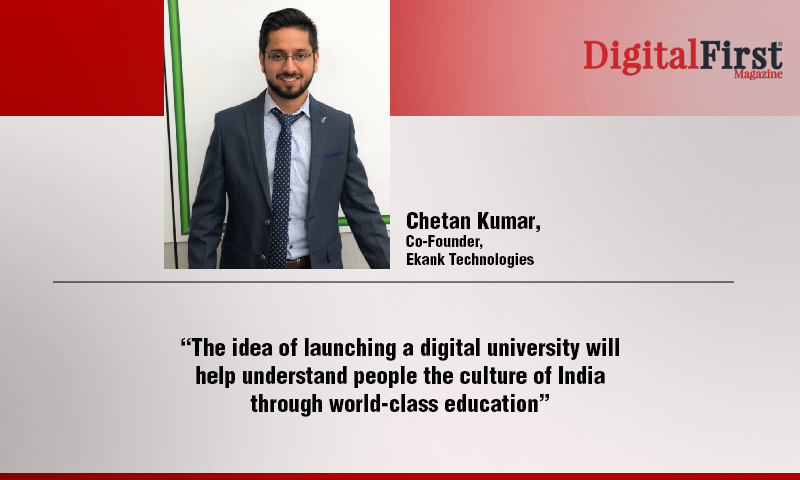
Firstly, would like to appreciate our government extending the tax initiatives for startups up to March 2023. Through tax initiatives and new reforms in the direct tax, the startup ecosystem will enhance effectively within no time. The idea of launching a digital university will help understand people the culture of India through world-class education.
The Introduction of Digital currency by the central bank will definitely lead away to cheaper currency management. The highlight of the budget for us is the expansion of the One class, one TV channel’ program of PM eVIDYA which will help promote the regional languages in the country as through the program, all states will provide supplementary education in regional languages for classes 1 to 12.
The government has also focussed on establishing a positive mental health environment and with Ekank Technologies, we completely support this initiative through our feature of ‘light read’, which gives the users a chance to enjoy stress-free reading.
Vikas Jain, Co-Founder and Ceo, World of Play
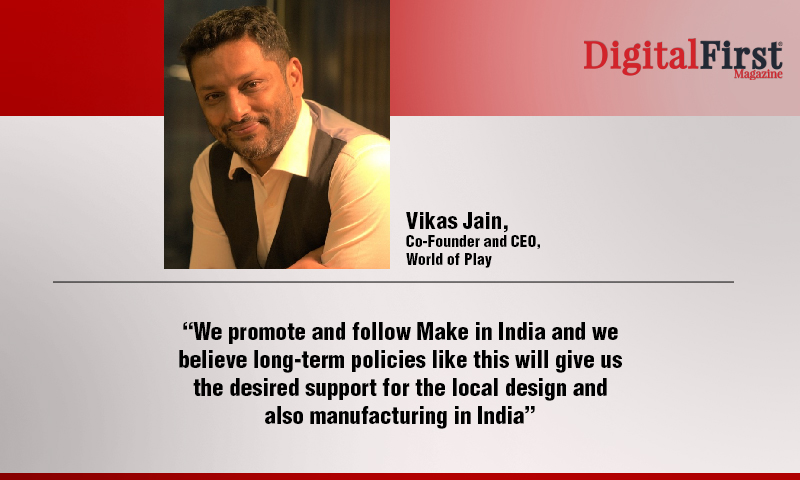
We support the government’s focus on technology, it will help many tech-based companies like WORLD OF PLAY to come up with exciting product experiences for the Indian consumers. We welcome the focus of the government on the wearables and acoustic component ecosystem and domestic manufacturing and believe on the long term, this focus will make India a formidable design and manufacturing powerhouse.
Additionally, the boost in ease of doing business and special impetus on creating 60 lakh new jobs will give the desired push to the goal of becoming Atma Nirbhar Bharat. As a brand, we promote and follow Make in India and we believe long-term policies like this will give us the desired support for the local design and also manufacturing in India.
Vijay Kumar Mikkilineni, Head of Marketing, TCL India
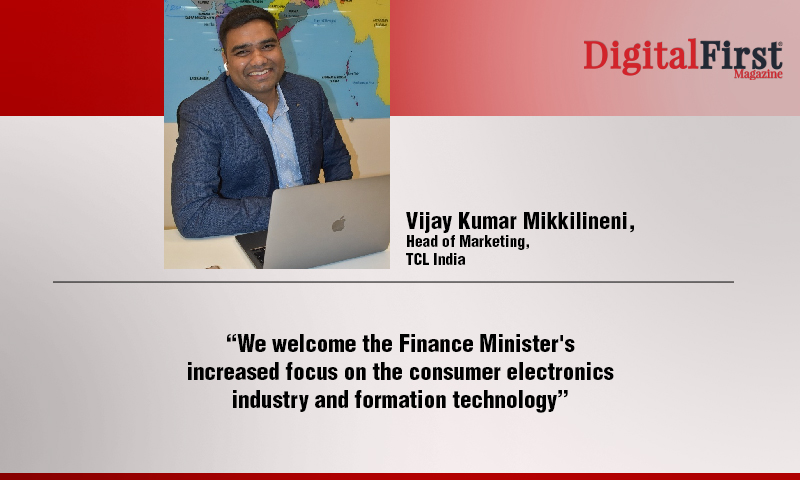
We welcome the Finance Minister’s increased focus on the consumer electronics industry and formation technology, which will definitely benefit all worldwide companies, including ours. The 2022 Union Budget allocated 1.97 lakh crore ($26 billion) for PLI projects, notably electronic components, which are among the 13 vital sectors that would undoubtedly help our economy expand. Furthermore, reduced customs taxes will encourage electronics manufacture, which will benefit the electronics industry.
Rimo Bose, PR and Branding Manager, TCL India

Extending the support to the government for increasing focus on the consumer electronics sector and formation technology will undoubtedly benefit all global brands like us. The recent Allocation of Rs 197 million (US $ 26 billion) to PLI projects in the United Budget (202122), especially electronic components, is one of the 13 key sectors that will definitely help our economy grow. In addition, tariff reductions will drive the production of electronic devices, which will be the greatest benefit of the electronic device sector.
Sai Srinivas, Co-Founder and CEO, Mobile Premier League (MPL)

It is very encouraging to see that the Union Budget has taken into consideration some of the long-pending suggestions for the Animation, Visual Effects, Gaming, and Comics (AVGC) sector while noting the strong potential this industry holds for employment generation as well as taking ‘Made in India’ game titles global.
We welcome the Hon’ble Finance Minister’s announcement to set up an AVGC Promotion Task Force to provide a much-needed boost to the sector. This announcement highlights the need to build capacity to serve both domestic and global markets, and is a strong indicator of the impetus that the government is willing to provide for its growth. It is also heartening to see the government’s commitment to work with the industry, allowing for a balanced approach that accommodates the needs of all stakeholders and strengthens the ecosystem holistically. A progressive tax regime, predictable regulatory framework and supportive funding policies will allow the industry to compete on the world stage and fulfil the Hon’ble Prime Minister’s vision for the Indian digital gaming sector to be a global powerhouse. Moreover, it will also help develop a workforce of young and employable AVGC professionals to usher in the next tech revolution from within India.
The Budget rightly mentions that promoting the digital economy and sunrise sectors will be a priority in the next 25 years (75 to 100 years of India’s Independence)—the Amrit Kaal of India. With a renewed focus on the AVGC sector, blended financing for deep tech and IT, hardware and electronics manufacturing combined with the deployment of 5G and affordable internet in underserved areas, it is clear that the government is committed to taking the Indian startup ecosystem to the next level.
We are hopeful that with the positive support of the government, the coming years will see online gaming, VFX and esports startups leading the charge in the global economy. By developing deep tech intellectual property and exporting services, they can help cement India’s position as a world leader in the sector.
Rajarshi Bhattacharyya, Chairman and Managing Director, ProcessIT Global
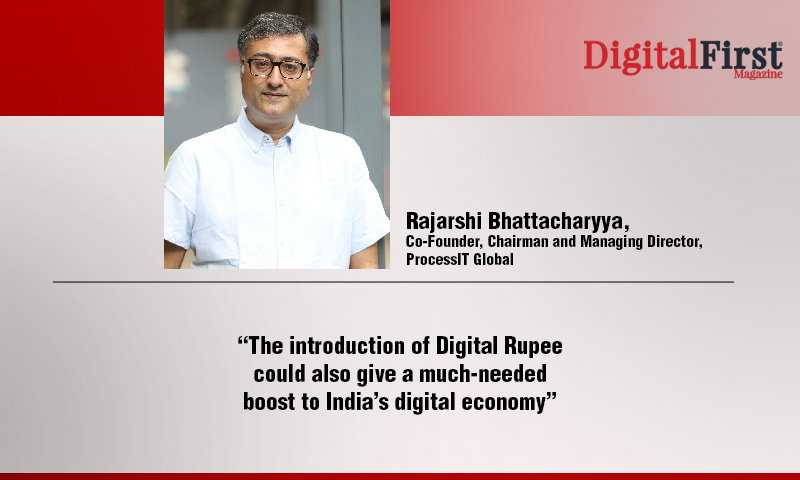
The Union Budget 2022 is a forward-thinking, positive, tech-oriented, macro-budget. A positive tone was set with India estimating a GDP growth of 9.2% for FY 2022, the highest among all economies.
The budget is pro-young and aspirational India with emphasis on digital and technology, especially with a focus on health, education and the start-up ecosystem. There is now better clarity on the implementation of digital technologies across the sectors. Spectrum auction for 5G rollout to be conducted and completed in 2022-23 is another positive step towards growth.
Regarding promoting the growth of start-ups, it is encouraging to know, the tax incentives will be increased for one more year, i.e., extending the period of incorporation of the eligible start-up to, 31st March 2023 from the earlier 31st March 2022. Furthermore, the launch of the ease of doing business and ease of living in general and extending of the Emergency Credit Line Guarantee Scheme up to March 2023 for MSMEs in the hospitality and related services are encouraging measures too. The raising and accelerating MSME Performance (RAMP) programme with Rs. 6,000 crore outlay over the next 5 years will certainly support the sector to become more competent.
Stride towards progress is seen with the inclusion of Data Centre and Energy Storage Systems in the harmonized list of infrastructure as it will certainly facilitate credit availability for digital infrastructure and clean energy storage, which is the need of the hour.
It is heartening to know the proposed skilling programme will be re-oriented for skilling, up-skilling and re-skilling of our youth, the future of India, with the launching of the e-portal to deliver online training, besides providing relevant jobs and entrepreneurial opportunities.
The establishment of Digital Banking Units across the country will further promote digital banking and the adoption of digital payments. The introduction of Digital Rupee could also give a much-needed boost to India’s digital economy.
Nakul Anand, Chairman, FAITH
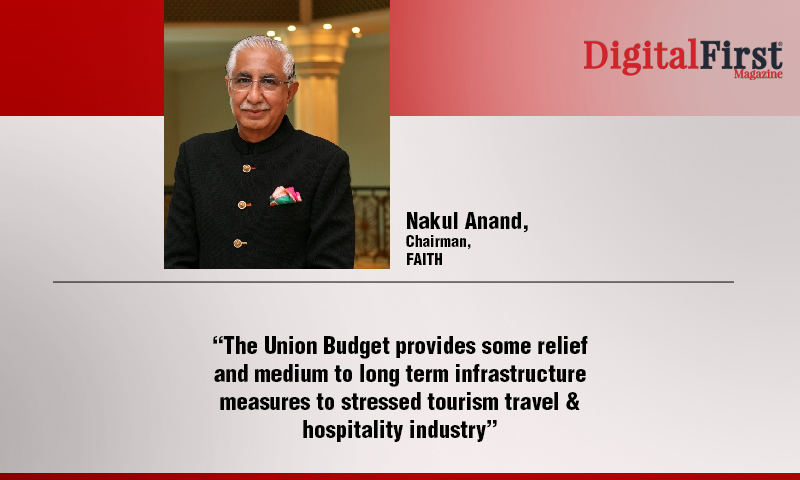
The Union Budget provides some relief and medium to long term infrastructure measures to stressed tourism travel & hospitality industry, but there was an immediate opportunity for more direct intervention to support the highly stressed tourism travel and hospitality companies and their employees.
Vingish Vijay – Founder & VP, 90+ My Tuition App
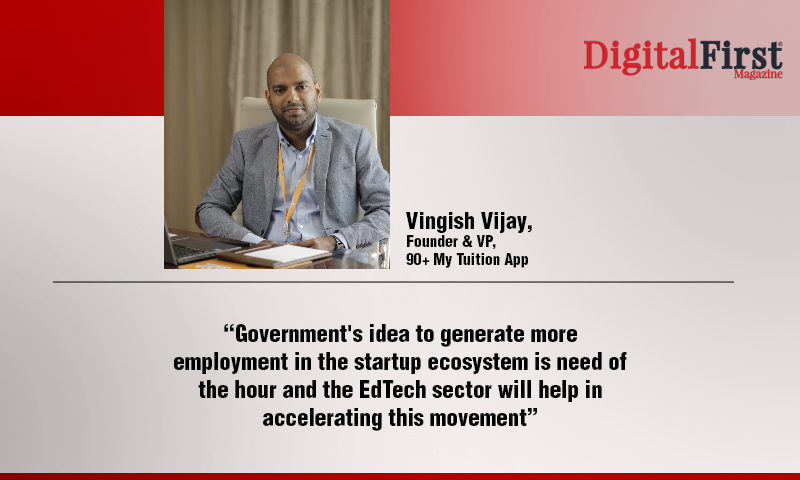
We congratulate the Finance Minister for a growth-oriented budget. The budget reflects the need to overcome the learning loss induced by the pandemic. The idea to start a One Class One TV channel to bridge the learning loss induced by the pandemic was required and we are excited to support this wonderful initiative. The announcement to facilitate supplementary learning in regional language for classes 1 to 12 was long overdue and is in sync with NEP 2020 to boost learning in languages other than Hindi and English. The government’s idea to generate more employment in the startup ecosystem is the need of the hour and the EdTech sector will help in accelerating this movement. We also welcome the establishment of AVGC Promotion Taskforce as edtech heavily relies on animation and visual effects and is a creator of opportunities for youth skilled in animation and visual effects.
Ranjita Raman, CEO, Jaro Education
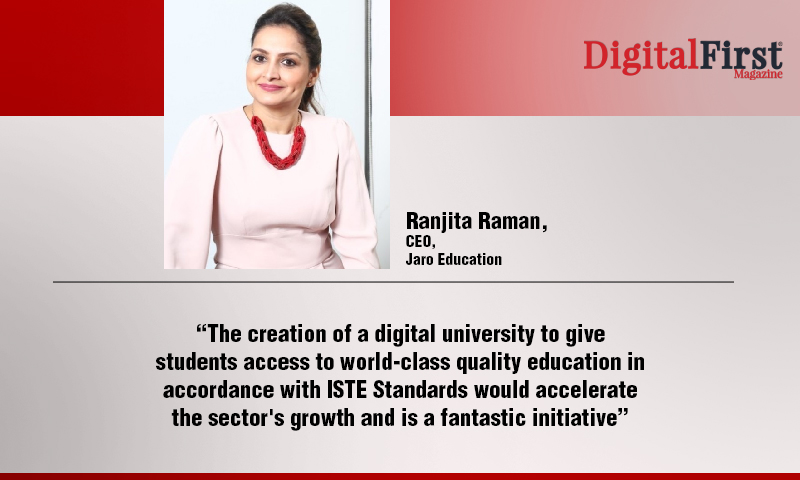
We welcome the Union Budget 2022. Through this, the government has put a major focus on education, skilling, up-skilling, and re-skilling. This is absolutely what the country and the industries needed right now. The centre’s vision of a Gift City, where world-class international colleges and institutes will provide courses free of domestic regulation, is a huge step forward. The creation of a digital university to give students access to world-class quality education in accordance with ISTE Standards would accelerate the sector’s growth and is a fantastic initiative.
Yeshwanth Raj Parasmal, Co-founder, 21K School
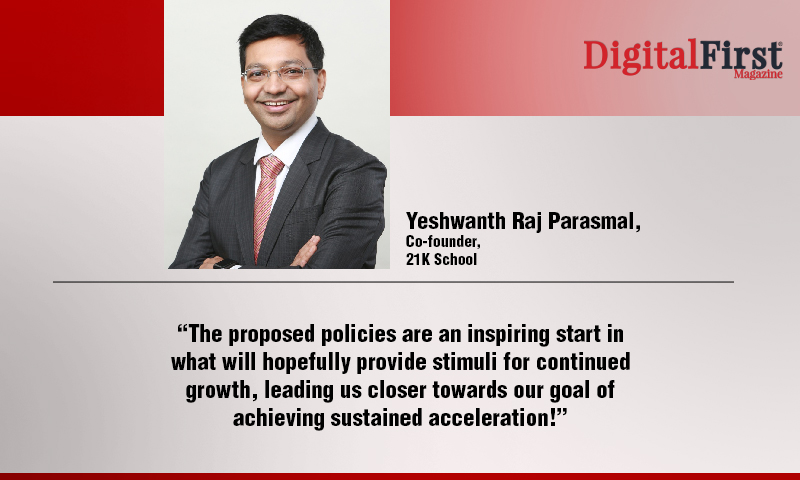
The Finance Minister has unveiled a Budget that aims to bridge the economic gap between India and Bharat. The proposed policies are an inspiring start in what will hopefully provide stimuli for continued growth, leading us closer towards our goal of achieving sustained acceleration!
I welcome the focus on digital aspects of education and creating greater access for students with structured, high-quality content. The announcement of Digital University is most welcome and in line with the trend of online schools across the country. But, it misses the opportunity to leapfrog with more significant innovation and investment for improved access, equity and affordability. The structural flaws of the education sector and problems on the ground could have been addressed. Exciting times are ahead for Digital Education.
Sumeet Mehta, Co-founder and CEO, LEAD

Overall, this has been a progressive budget as it accelerates the government’s efforts towards inclusive and sustainable development. As an educator, I welcome the emphasis on creating digital and free-to-air channels of education. However, at the same time, the budget appears to circumvent physical schooling. I sincerely hope that is not the case. While online learning was inevitable due to the Covid-19 pandemic, it would never be as effective as offline learning, which brings out the best in students in terms of learning outcome and performance. Online education can at best only play a supplementary role in education. I would have also loved to see a greater focus on improving the teaching and learning processes in our schools vis-a-vis infrastructure and tech-enabled curriculum. Going forward, I hope there will be policy changes in that direction.
Rajiv Tandon, CEO-Executive Education at BITS Pilani WILP

While I did expect the budget to make announcements on online and remote learning to expand access to education and learning, I was particularly happy to notice the mention of virtual labs and e-labs to give skill training online. Both these elements can transform the mere access to education using the internet to high impact and rich learning experiences. At BITS Pilani’s Work Integrated Learning Programmes division, we have used digital labs for a few years now and believe that in several domains virtual & digital labs can enable learners to practice what they have learnt in a safe environment without going to a physical lab. Virtual & e-labs could be a boon for learners in a vast country like ours who do not have access to good physical labs infrastructure.
Dr Dishan Kamdar, Vice-Chancellor, FLAME University
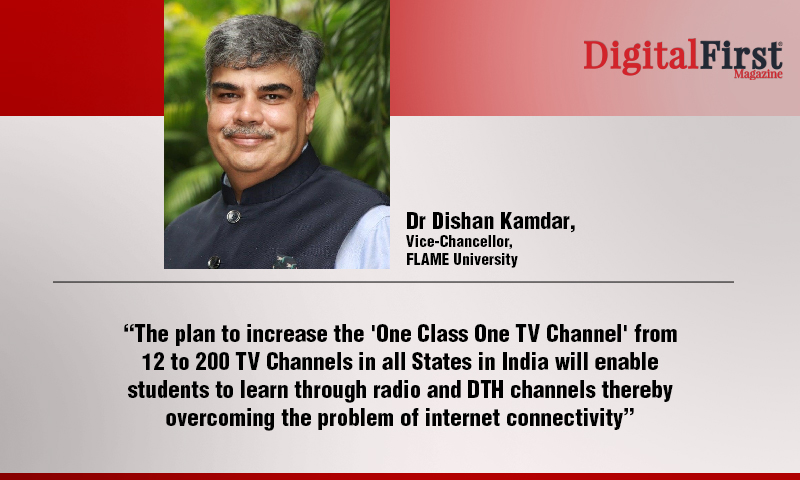
The decision to establish a digital university is a disruptive and futuristic decision that will benefit a large number of students even from the remotest part of the country by making world-class education accessible. This will surely give wings to the dreams of deserving students and meet the goal of providing high-quality education to all students across the country.
The plan to increase the ‘One Class One TV Channel’ from 12 to 200 TV Channels in all States in India will enable students to learn through radio and DTH channels thereby overcoming the problem of internet connectivity. The two decisions truly reflect the Government’s aims to leverage technology advancements and use them as tools to meet the educational aspirations of a large number of students in the country. They have set an example that is worthy of being emulated by others.
Shashank Khade, Co-Founder & Director, Entrust Family Office
This is a Budget that is focused on prioritizing capital expenditure as a key lever for growth, which we endorse as an approach given the multiplier effect of many of these investments. In that sense, the budget augurs well for the economy and the continuing decline in revenue expenditure as a share of total expenditure towards capital expenditure improves the quality of expenditure. To put it in context, the 35% increase in capital expenditure, 55% increase in Road sector allocation and 17% increase in railways are significant numbers. On top of this is support to state governments towards capex. Of course, the execution of projects in these areas and in urban infrastructure is key towards enjoying the full benefits of this expenditure. The other point to note is that a larger share of defence capital expenditure is targeted to domestic procurement that could also have second-order implications for R&D and multiplier effects in the economy.
The Budget is extremely future-oriented. Emphasis on digitization of government processes, incentives for startups enabling the flow of capital (lower capital gains for venture investments), clean energy enablers for fundraising and PLI, categorizing data centres and energy storage systems as infrastructure, recognizing gaming as an area of potential, and a general focus on sunrise sectors is evidence of this. The impact of this will be felt over the next decades and not in the short term. The taxation on crypto currency while at the same time talking about a digital rupee indicates the government’s recognition of blockchain as an important future technology to enable.
The gross market borrowing through G-secs for 22-23 at Rs 14.95 lakh crs is higher than the amount expected by the market and has led to a sharp increase in G-Sec yields. However, tax buoyancy is very high and could well surprise on the upside thereby leading to a lower fiscal deficit in the current and coming year than forecasted. However what quantum of issuance would be issued as sovereign green bonds and whether it shall be issued to a new set of investors (viz Foreign Institutions) is a key part we can watch out for. Overall, the credibility of numbers is very high as is evident in the tax growth rates and PSU divestment numbers being very moderate. Indicative of intent to under-promise and over-deliver.
Kulin Shah, Co-Founder & COO, Onsurity
FM’s budget speech addressed the much-needed impetus for promoting the digital economy and fintech with the GOI committed to strengthening the abilities of the poor. The opportunity for correcting tax errors for up to 2 years and support to startups are also welcome decisions. We also welcome the move to have a national telehealth program in light of the mental health crisis induced by the pandemic. It will be interesting to see what the Government has planned for the National Digital Health Ecosystem, we look forward to its alignment to the Universal Health Coverage and aim to support the initiative with our technology and services.
Shashikant Burnwal, Co-Founder & COO, Trillbit
By extending tax incentives to start-ups by one year, the Indian government has added fuel to India’s start-up ecosystem and this will incentivise start-ups that are on the track of profitability. The second important thing for start-ups that the Finance Minister has announced is a fund that will be facilitated by NABARD to finance the start-ups for agriculture and rural enterprises focusing on the value chain of farming and it really shows government commitment toward supporting agriculture-based enterprises.
On a personal level, I also liked the clarity on crypto tax structure, which may look burdensome for retail investors but in my view, it is an acknowledgement from the government for this sector and a transparent tax structure is better in the long haul. Overall, this year’s budget is balanced and conducive to strong business growth which we are expecting for the year 2022.
Anshul Sharan, Co-Founder & CEO, Elever
Net positive for markets as more money in hands of big investors and high capex, can create long-term value for investors in core sectors. Add fiscal discipline with no populism and all-time high tax collection, this is the perfect budget for the market. The focus is on incomes rather than welfarism, concessions and handouts.
Ondrej Kubik, CEO, Home Credit India
The Union Budget is progressive with an expansionary approach, touching upon all sectors both traditional and sunrise, giving a pragmatic push to financial inclusion, made-in India, digital and green economy to strengthen the economic growth stimulus achieved in pandemic years. The finance minister has hit the bullseye by laying the foundation for growth-oriented investment with the announcement of a 35% rise in the government’s capital expenditure for FY 23, which will surely have a multiplier effect on the economy. Complementing the rising allocation towards infrastructure boost, supporting MSME fund scheme extension and increased PLIs for building domestic industries, the budget lays much-needed emphasis on sunrise sectors. Support for digital economy expansion, financial inclusion, skilling & upskilling through digital learning and fillip to be a driver of clean energy & mobility, shows the government’s affirmative action and foresighted outlook to keep the economic growth engines on an accelerated path.
Siddhartha Gupta, CEO, Mercer Mettl
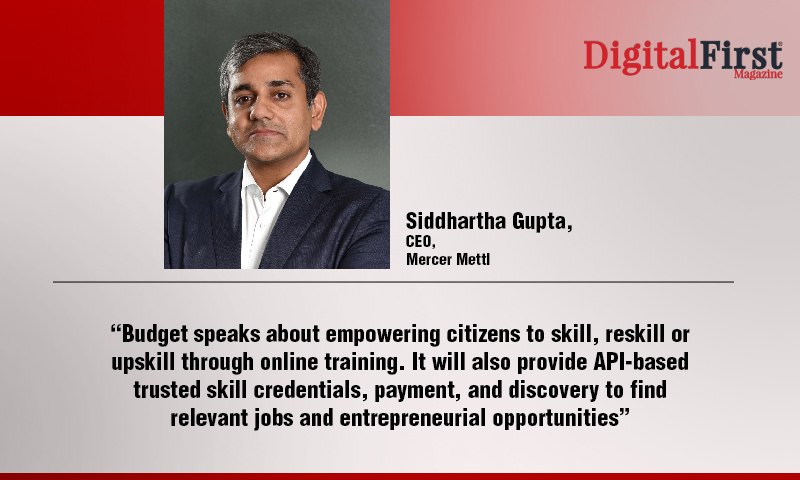
Aligning Skill programs with Industry is very positive news. Covid has taken the wind out of the Skilling initiatives of GOI over the last 2 years and there was a need to promote continuous skilling avenues, sustainability, and employability. Another welcome move is to re-look the national skill qualification framework (NSQF). This will further improve the Skill levels of youth and their ability to get jobs. We are proud of our partnership with GOI on Digital Literacy. Budget speaks about empowering citizens to skill, reskill or upskill through online training. It will also provide API-based trusted skill credentials, payment, and discovery to find relevant jobs and entrepreneurial opportunities. We have been working on Digital Credentials and would love to expand this to Skill credentials through Digital means as well and bridge the gap between Education and Industry. The launch of Digital University recognizes the role Tech would play in keeping education disruption less in the future. An announcement in this direction augurs well for the Ed Tech startups which have recognized this gap and are trying to innovate and transform the segment.
Himanshu Gautam, Co-founder and CEO, Safalta Education Pvt Ltd.
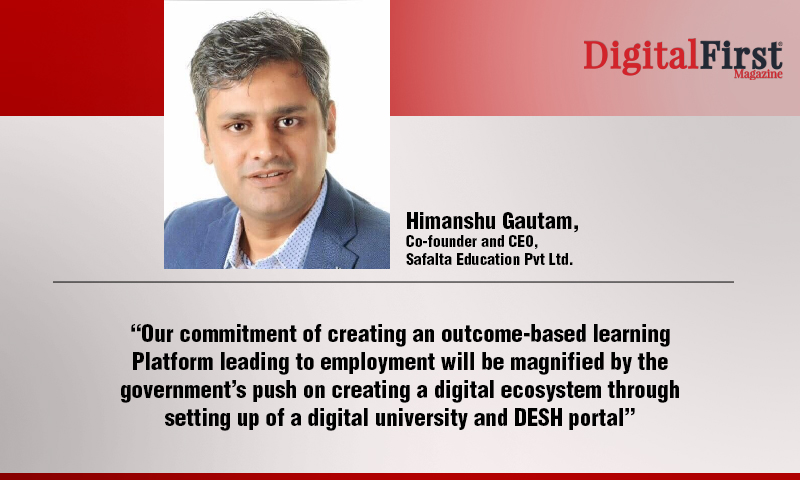
The 2022 budget’s approach to aligning education with employability resonates with our vision. The National skill qualification framework will be of great help for the right kind of talent creation for actual industry needs, on which Safalta contributes through its skill courses. We also aim to contribute to the government’s vision of providing supplementary education in regional languages for students of class 9-12th. Safalta provides an affordable, high-quality education through vernacular pedagogy for students of semi-urban and rural India. Our commitment to creating an outcome-based learning Platform leading to employment will be magnified by the government’s push on creating a digital ecosystem through the setting up of a digital university and DESH portal. We welcome the FM’s announcement to extend the period of co-operation up to 31st March’23 for tax incentive of Startups.
Anish Bafna, CEO & MD, Healthium Medtech
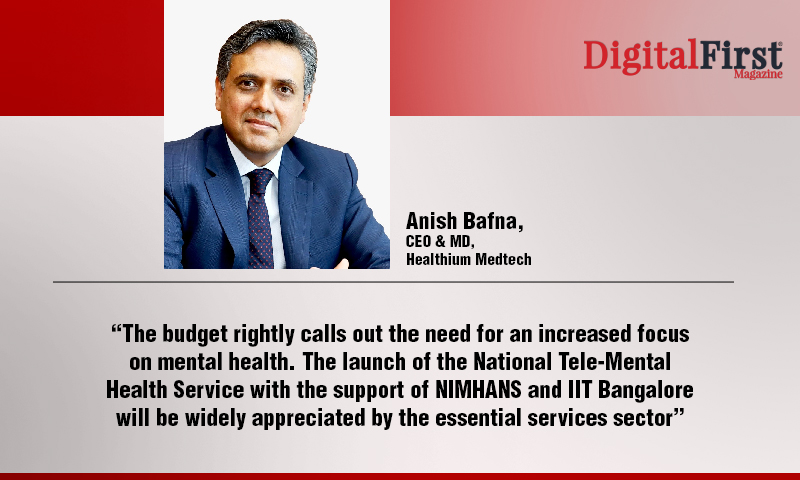
The Healthium Group welcomes a progressive and growth-oriented budget for FY 22-2023, under the continued mission of Atmanirbhar Bharat. We are delighted with the government’s initiative for encouraging sunrise sectors like Medtech with the promotion of thematic funds for blended finance. Increased investments in infrastructure will help improve the supply chain and aid customer access. Custom duty exemptions on medical devices and revision of tariff structures for manufacturing intermediates will strengthen India’s supply chains for a global hub in medical devices. The open platform for National Digital Health Ecosystem will benefit health providers and caregivers with universal access to healthcare facilities. The budget rightly calls out the need for an increased focus on mental health. The launch of the National Tele-Mental Health Service with the support of NIMHANS and IIIT Bangalore will be widely appreciated by the essential services sector.
Ritesh Khandelwal, Chief Finance Officer, NxtGen Datacenter and Cloud Technologies
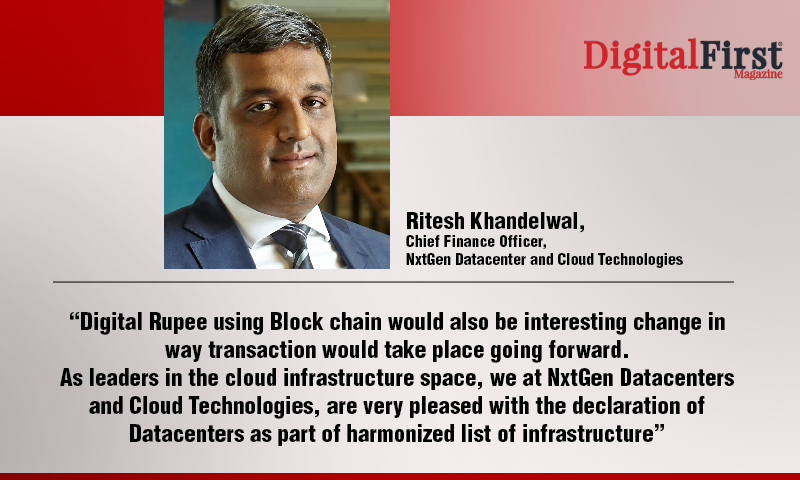
I believe the budget 2022 is a fantastic take and the government has made it simple and effective. They have directly targeted the apex areas, keeping health and infrastructure in focus considering the effects of the pandemic. With rapid digitalization, the taxation of cryptocurrency is another landmark achievement in this year’s budget, as previously digital currency has always been in the grey area.
Digital Rupee using Blockchain would also be an interesting change in the way transactions would take place going forward.
As leaders in the cloud infrastructure space, we at NxtGen Datacenters and Cloud Technologies, are very pleased with the declaration of Datacenters as part of the harmonized list of infrastructure. This listing gives us the benefit of working with bank centred facilities. Earlier data centres were under IT/ ITES (IT Enabled Services), but by having them listed as infrastructure providers, we now have access to low-rate loans which is a straightforward benefit to the industry.
The only thing that lacked in this budget was the clarity on government stand and expenditure towards Smart Cities. The government has spent a lot of money and time on this project previously, therefore we were looking forward to getting insights on it. Similarly, we were also expecting some clarity in the data localization policy.
All in all, we not only welcome budget 2022 but appreciate it as well.
Kavitha Subramanian, Co-Founder, Upstox
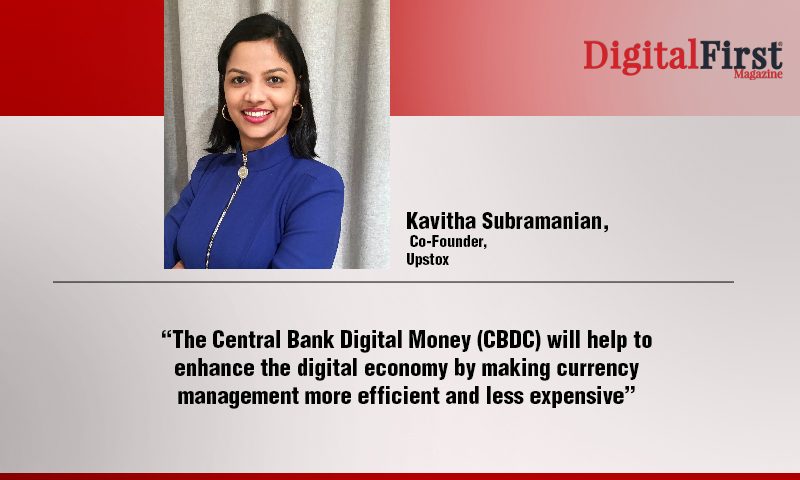
The Hon’ble Finance Minister has presented a digital-first Budget that focuses on quick, holistic, and inclusive economic growth. The focus on start-ups and fintech in this year’s Budget is a fantastic step that will help these sectors grow further. The introduction of 5G and the spread of optical fibre to villages would provide a boost to the Fintech industry. It encourages digital investment platforms like ours to expand their services, resulting in an increase in retail activity in Tier 2-Tier 3 cities and towns. The Central Bank Digital Money (CBDC) will help to enhance the digital economy by making currency management more efficient and less expensive. The capping of surcharge at 15% on Long-Term Capital Gains (LTCG) tax for all listed and unlisted corporations responds to a long-standing demand for new-age businesses.
Milan Ganatra, Founder & CEO, 1SilverBullet
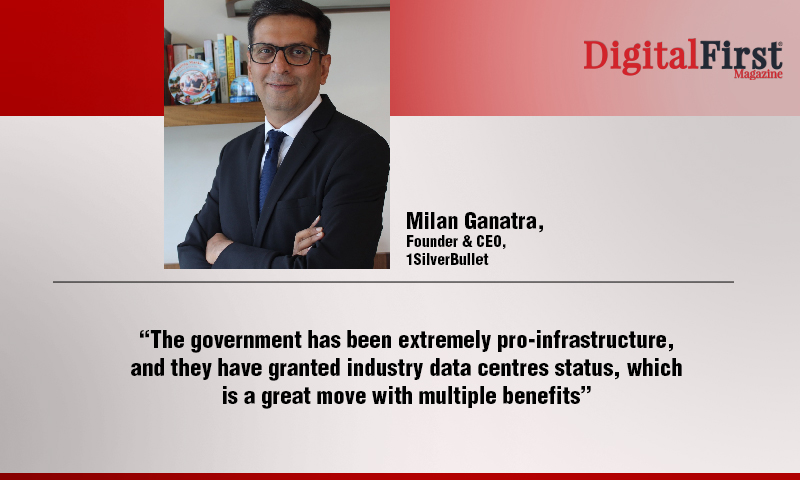
Firstly, I would like to express my appreciation and welcome the Budget presented by the government, which has been tremendously encouraging for India’s startup ecosystem. Bringing in the unlisted equity taxation at par to the listed, will encourage more Mergers and Acquisitions (M&A) in India, allowing a substantial quantity of wealth to flow into the pockets of founders and investors, bettering the appeal for investors to invest in unlisted equities or startups in the country. The administration is also proposing to form a committee to develop a framework for attracting more investments and monitoring regulations, which is a wonderful step forward from the eyes of the Fintech startup entrepreneur. Finally, opening various things at the Indian Financial System Code (IFSC) will allow it to become a worldwide financial services centre, fueling a slew of Fintech-related operations. The government has been extremely pro-infrastructure, and they have granted industry data centres status, which is a great move with multiple benefits. Overall, the government has recognised the importance of technology, startups and has assured that there will be adequate and more entrepreneurial opportunities, which will be backed up by government assistance.
Rajesh Khosla, President and CEO, AGI glaspac
The Indian government this year has presented a growth-oriented budget with a special focus on boosting the manufacturing sector to create massive employment opportunities and to maintain India’s status as the world’s fastest-growing economy. The concessional corporate tax for newly incorporated manufacturing companies is a positive move towards promoting the Make in India initiative as this will encourage new manufacturing industries as well as increase private investment in this industry. The PLI Scheme(Production Linked Incentive scheme) in 14 sectors with the aim of creating 6 million jobs can be predicted to improve the performance of the manufacturing industries in the country by 4X in the next four quarters. We congratulate FM, Nirmala Sitharaman for presenting a budget that has laid a roadmap for the economic revival of India – despite the pandemic crisis.
Anand Maheshwari, Managing Director, Allen Digital Pvt. Ltd

Glad to see an overarching focus on encouraging paperless and digital advancements in the Union Budget 2022. Right from using a tablet to read out the budget to regarding Startups as the growth driver for the economy, Finance Minister Nirmala Sitharaman proposed a wide spectrum of progressive announcements across sectors.
As most of the schools and other educational institutions have chosen online classes due to the third wave of the pandemic, the digital divide further increases. By introducing the ‘One Class One TV Channel’ program by PM eVIDYA, and with fibre optic connectivity for last-mile digital reach in villages, the Govt. is trying to shorten the digital divide. It’s a great move as this will also enable all states to provide supplementary education, even in regional languages for classes 1 to 12. By developing digital universities that provide world-class quality education with ISTE Standards, the govt. is also encouraging EdTech start-ups to flourish. FM has also proposed to extend the period of incorporation of eligible startups by one more year (i.e. March 31, 2023) for providing tax incentives. This is going to be a boost for young startups and companies whose plans might have been delayed by the pandemic.
Unsoo Kim, MD, Hyundai Motors India Ltd.
Hyundai Motor India welcomes the progressive Union Budget announced today. The government’s strong approach towards accelerating infrastructure development, sustainability along with digitalisation in every sphere of business will give a strong impetus to the overall economy while empowering consumerism in India. The vision for clean mobility creating electric vehicle ecosystem is a positive indicator for the auto Industry and for its large supply chain. The forward-looking budget will lay a modular economic structure for every section of business and society in India.
Vishwastam Shukla, CTO at HackerEarth

The future of the world is tech-driven, and the sooner our policies align with the industry demand, the better it will be for our country’s talent pool and long-term growth. This year’s budget lays down the government’s vision in the same direction.
The digital university announced by the Hon’ble Finance Minister has the potential to make education more accessible and democratic, and bridge class divides that exist among students from Tier 1, 2, and beyond. This ensures skill and aptitude are given priority over mere pedigree and geographical advantages.
Too often, in the developer world, it is seen that good talent falls by the wayside when compared to a good ‘resume’. A digital ecosystem for skilling and livelihood can, in theory, provide many with the access to learn coding and explore other technologies. Self-taught coders are on the rise, and comprehensive and skilling programs aligned with the industry can improve the tech talent pool across the country, helping us stay ahead. In theory, skill assessment functionality will only add to the future readiness of the company’s youth. In practice, it will be interesting to know how the API-based skill credentials and payment layers will function.
With time, the impact and effectiveness of these actions will unfold, however, I personally will have my eyes peeled for our first self-taught, digital university-certified, tech leader.
Prashanth Nanjundappa, VP – Product Management for the Chef Business Unit, Progress (IT firm)
The Indian government has shown its inclination towards digitisation in various fields. The government has given a strong emphasis on spending on Infrastructure with the Special Economic Zones Act which will be replaced with new legislation for the development of enterprises and hubs. Alongside, the corporate surcharge rate that is reduced from 12% to 7% is needed to ensure that digitalisation penetrates even on to the small businesses. This means more money in the system and will act positively towards faster growth of the economy. The government has also given an additional push to upskilling, reskilling and skill development segment in the budget which will result in extensive use of technology which in turn will give a boost to the job market in India and encourage tech companies to invest in R&D and explore avenues to leverage existing tech and create new products.
Innovation Ecosystem enabler, T-Hub’s CEO, MSR
This year’s Budget by Finance Minister is pragmatic, positive, and committed to the startup sector which needed a deliberate boost to further innovate and help in sustaining the economy. The extension for startups on both, the eligibility for claiming tax holiday and the capital gains exemption for investment by another year (March 2023) is a progressive continuity of last year’s budget policies powering economic growth. It is encouraging to see the government’s support for startups across different sectors like healthcare, gaming, drones, Electric mobility and the defence sector. The budget provides a major boost to the research and development segment and defence startups by announcing the launch of defence R&D for industry, startups and academia.
The sector-specific announcements like fund to be facilitated through NABARD to finance for agriculture and rural startups, and promotion of Drone as a service and giving new manufacturing companies with a concessional corporate tax rate of 15 percent will further strengthen the startup ecosystem. The focus on ‘Ease of doing business is a great step, as it will further promote entrepreneurship in the economy. I also appreciate the government’s decision regarding The ECLGS credit scheme guarantee cover which will provide collateral-free loans to stressed-out SMEs and MSMEs.
In order to promote long term investments in equity of startup, the rate of surcharge has been capped at 15%, irrespective of the amount of long term capital gains. This is beneficial for the individual investors who are holding shares for more than 12 months and selling them thereafter, thus treating gains on the sale of such shares as long term capital gains. We are also eagerly waiting for FM to announce measures to scale Venture capital and private equity as it has facilitated India in becoming the fastest growing startup ecosystem with an investment of more than Rs 5.5 lakh crore last year. Overall the Budget 2022 reaffirms the Government’s push to make startups job creators and multipliers in one of the largest and most exciting economies in the world.
Deepthi Ravula, CEO of WE HUB (exclusive incubator for women entrepreneur)
The Finance Minister announced extension of the tax holiday up to March 2023 and an expansion of its guarantee fund by Rs 50,000 crore to Rs 5 lakh crore. Millions of MSMEs impacted by the pandemic may receive additional support from ECLGS, aiding them in softening but not minimizing the impacts. The dedicated fund for Agritech is a great move in the right direction as it will regulate and infuse capital in to a much needed sector of the economy. We are pleased that the capital gains tax exemption on startups investments is extended, as this will encourage more investment in startups. In addition, the National Skill Qualification Framework will focus on enhancing skill-building and upskilling – as well as support for the job market.
However, with the emphasis on NariShakti, it looks like a missed opportunity on supporting inclusion and diversity. With the pandemic enabling more women to be part of the work force and entrepreneurship, the budget lacked support in terms of working capital, technology upgradation, incentives to companies, MSMEs and startups for addition of female workforce. Although the startups have contributed a great deal of energy and capital, the path to preferential procurement has not been clearly defined yet, as well.
Further, we are also looking forward to the interconnectivity of MSMEs platforms – Udyam, e-Shram, NCS and Aseem portals – and believe this will improve entrepreneurial opportunities and facilitate operability for MSMEs. In light of the amazing value that Startups have been able to bring over the past year, creating 80+ unicorns, we hoped the Budget 2022 could have included additional perks for Startups at the acceleration phase, including incentives and additional support when working in a Tier 2 or Tier 3 region.
However, we have great confidence in Indian entrepreneurs and SMEs. It is evident from our past experience, including the pandemic, that they are extremely resilient and would demonstrate their grit, determination, and might on a global stage.
Vikas Ahuja, CEO of CrossTower India (crypto exchange)
The government has recognised the potential and increasing adoption of virtual digital assets. Today, the Finance Minister announced in the union budget 2022 that any income derived from the transfer of virtual assets will be taxed at 30%. This is the first step towards embracing the crypto and blockchain industries in India, we believe this is a positive move. With this move, the Indian government has also removed the uncertainty surrounding the crypto sector in India, by recognizing it as an asset class. We also believe this will allow the government to better oversee crypto transactions. In addition, introducing a digital rupee utilizing blockchain technology represents a major advancement for the crypto sector, as it will accelerate crypto adoption and put India on the cutting edge of the digital revolution.
Tushar Aggarwal, Founder & CEO, StashFin
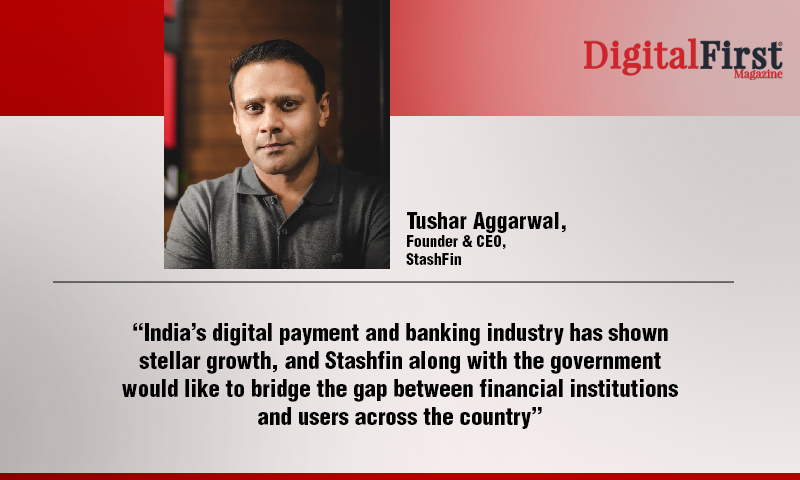
The Finance Minister has announced support for digital payment and banking in the Union Budget 2022-2023, which will be welcomed by the sector. The measures include introducing a Digital Rupee that is to be issued by the RBI, prioritizing digital economy and fintech industries. We, at Stashfin, are grateful to the Government of India for this decision of extending support towards neo-banking start-ups.
The government is taking steps to ensure that digital services reach even remote areas in the country. India’s digital payment and banking industry has shown stellar growth, and Stashfin along with the government would like to bridge the gap between financial institutions and users across the country.
Building awareness of digital payments and promoting financial literacy is critical to India achieving the vision of a $1-trillion digital economy. We look forward to strengthening the payment ecosystem and go along with the government vision for financial inclusion via digitalization
Krupal Parchure, Head Fintech & Payment Solutions, MYn
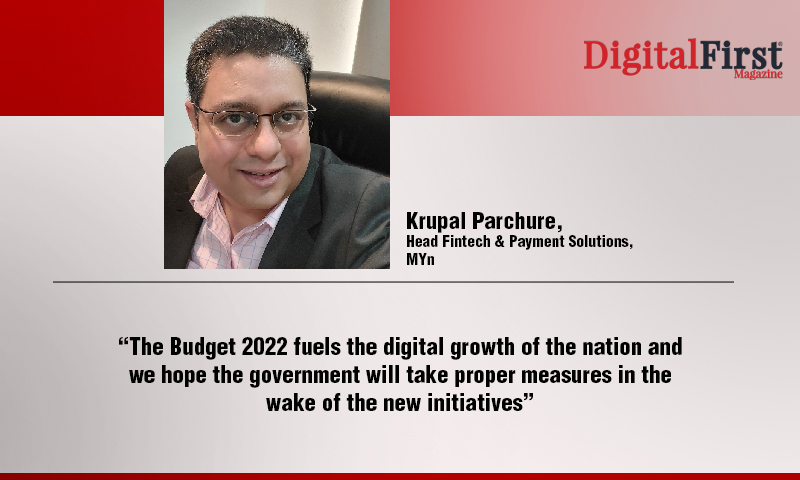
I believe the budget 2022 is an amazing take by the government. They have covered most of the key focus areas and have announced some very calculated measures and policies. Like, for MYn, an app that works in the social media space, E-registrations for content developers was one big highlight of Budget 2022. This will give a proper definition and recognition to the content creation professionals. Another landmark achievement would be the introduction of digital currency. It decreases the dependency on cash, transactional & settlement costs. It opens up regulated & legal tender-based payments as well.
Government has also given easy access to credit for MSME sector, which is in line with RBI’s decision to have an Account Aggregator framework. This will narrow the credit gap that exists for the MSMEs and will democratise credit.
However, there are many areas that are not aligned well.
For example, Budget 2022 promotes gaming platforms, drones for crop digitization & land records, e-passports and open platforms for health services which leads the path for Digital India. But it arises the question- will a citizen’s health records be exposed to big tech? The fact is these initiatives need a very strong data privacy setup and Indian data privacy laws need clarity. So, Is India ready to take data privacy seriously now?
Another achievement in this year’s budget is taxation of crypto currency and NFT, as digital currency has always been in the grey area. However, there are no operational guidelines, nor regulation around crypto and NFT. So how is the government talking about taxation first, without a clear policy on operating it?
Overall, the Budget 2022 fuels the digital growth of the nation and we hope the government will take proper measures in the wake of the new initiatives.
Krishan Agarwal, Head of Finance, 75F, India
The 2022 budget gives impetus to energy and infrastructure as one of the focus areas. The Government has factored in various projects that could boost the country’s infrastructure and economy. The emphasis on CAPEX expansion will also assist organisations in expanding their operations and pursuing new growth opportunities. The infrastructure budget is a welcome relief as it will aid specialised financial organisations to fund infrastructure projects that require long-term capital. We are also pleased to see the government taking proactive steps towards energy transition, climate change, and sustainability in this year’s budget. It is the need of the hour to focus on sustainability and energy efficiency for businesses and building infrastructures. We hope that the allocated funds will be used for projects to reduce carbon emissions and that the low-carbon development strategy will create new job possibilities in the country. The ease of doing business would also provide some relief for businesses to carry out operations smoothly.
Prem Kumar, Founder & CEO, Snapbizz
With the government unveiling the budget today, the focus for the fiscal year 2022-23 is clearly on infrastructure investments, digitization, and financial inclusion. The emphasis on infrastructure investments is likely to drive sustained employment growth while the MSME and Fintech sectors are expected to drive inclusive recovery and financial inclusion. With accelerated digitization resulting from the pandemic and the Digital India push, the digital payments sector has flourished while redefining the retail sector. More reforms are also expected to be implemented to help small retailers become more Aatma Nirbhar, thereby sustaining and strengthening the local retail ecosystem. Small merchants who are the backbone of our economy and national infrastructure are today embracing digital transformation, becoming more accessible to customers, and offering more streamlined solutions. The budget provides an impetus to Growth, Consumption and hopefully a Sentiment impetus too. While it is possible that the budget may fuel inflation, a consumption and growth push is urgently needed at this time. Daily consumption industries, such as FMCG, will benefit from a boost in recovery and growth.
Aditya Agarwal, Founder, Wealthy
The unveiling of Budget 2022 for the fiscal year 2022-23 today has brought significant reforms for financial inclusion, with fin-tech being one of the primary focus segments this fiscal year. The establishment of GIFT-IFSC as a financial hub, and the financial charter will have a revolutionary impact on the financial system. The government has finally recognised digital currencies by introducing Digital Rupee with blockchain under the Reserve Bank of India, as well as other virtual asset properties. This is expected to broaden the range of financial avenues available and help investors construct a more robust investment portfolio.
Jesal Doshi, Deputy CEO, B Medical Systems
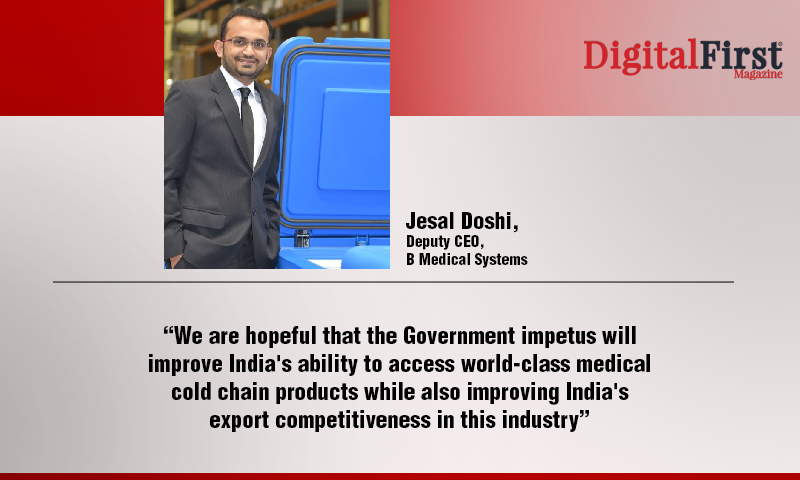
With India in the midst of a third wave of the pandemic, healthcare, including digital healthcare, and mental health has been a focus in Budget 2022-23. Finance Minister Nirmala Sitharaman launched an open platform for the National Digital Health Ecosystem, which includes digital registries of health providers and facilitates a unique health identity, a consent framework, and universal access to health services. The Finance Minister also stated that 95% of the 112 aspirational districts had made substantial progress in key sectors such as health, nutrition, infrastructure etc. and that efforts would now be focused on areas that were underperforming. We are hopeful that the Government impetus will improve India’s ability to access world-class medical cold chain products while also improving India’s export competitiveness in this industry.
Prateek Kansal, Head of India Operations & Engineering, Komprise
The thriving global tech market has been fueling notable momentum to e-commerce and other platforms, enabling “made in India” to be successful. Many tech companies, startups and established businesses alike have leveraged technological advancement in fields of ML, AI and blockchain to help grow the overall economy and tackle the impact of the pandemic. The Government, along with medical /health providers, have extensively leveraged the latest capabilities, such as real-time data analysis, to help India emerge from the pandemic and return to a strong global position. It’s a fantastic time to be working in tech here in India!
The national tele mental health progamme is a welcome initiative. Times have been tough on everyone during the pandemic. This program will help people cope with the extended lockdowns, restrictions and isolation we’ve all experienced over the las two years. Komprise has taken a proactive stance by extending health benefits to our employees. We have recently reworked our leave policies to be very accommodating of employees, including offering extended paid time off for employees to take care of themselves and their families resulting from Covid-19. We continue to work hard at encouraging employees and their managers to regularly connect with team members in an effort to create a caring and compassionate support system for everyone while we work toward aggressive goals in 2022.
Subodh Garg, CFO and Growth leader Pickrr
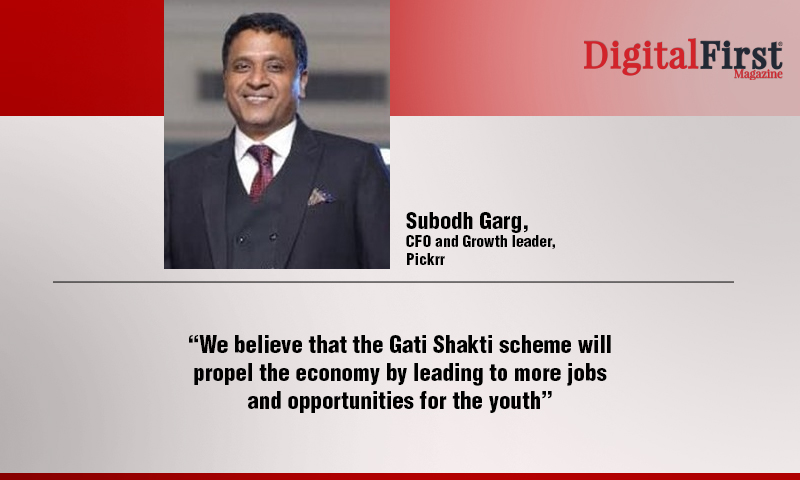
Union Budget 2022, with its strong impetus to technology and startups, is future-driven. The Gati Shakti scheme proposed by the Finance Minister in today’s budget will play a crucial role in shaping the logistics sector in the coming years. This scheme will provide a boost to the overall infrastructure landscape in India and will subsequently foster the advancement of the logistic segment. The announcement of the expansion of the highway network by 25000KMS and the development of 100 new cargo terminals will increase the connectivity and will help in the swift movement of goods across the country.
We believe that the Gati Shakti scheme will propel the economy by leading to more jobs and opportunities for the youth.
With technology playing a crucial role in shaping the country’s startups, it was great to see that the Union Budget 2022 introduced various start-up-friendly policies, tax relaxations to enable innovation and ease-of-doing-business and reduce compliance costs.
Mr. Shayak Mazumder, CEO & Co-Founder, Eunimart
The MSME industry has been at the forefront when it comes to facing issues and struggling to meet business needs as the pandemic hit. Over the last two years of the Union Budget, enough emphasis has been laid on schemes aimed at empowering these small and medium businesses. This year’s budget focuses on extending the ECGLS scheme, which is a big boon for the sector. We can anticipate growth and see these businesses have a fair chance at recovering, growing, and achieving. One can say that the Union Budget 2022 is pro-MSME.
Mukesh Kumar, Chief Executive Officer, Infiniti Mall
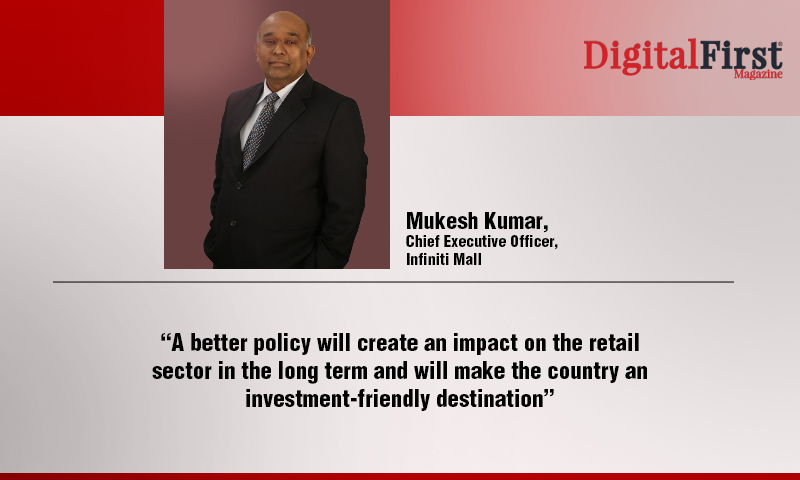
The budget 2022-23 presented by the Honourable Finance Minister is a balanced and forward-looking one, supporting the economic recovery of the country. The focal point is to stimulate the capital expenditure that will aid in employment generation and economic growth. We welcome the decision to initiate the second phase of Ease of Doing Business 2.0, which focuses on making processes more seamless with the encouragement of digitization of the previously manual processes. The conscious decision to eliminate the existing overlapping compliances will definitely ease the functioning of the overall industry. A better policy will create an impact on the retail sector in the long term and will make the country an investment-friendly destination. The focused initiatives brought forward by the government will put India on a sustainable growth path.
Satish Kannan, Co-founder & CEO, MediBuddy
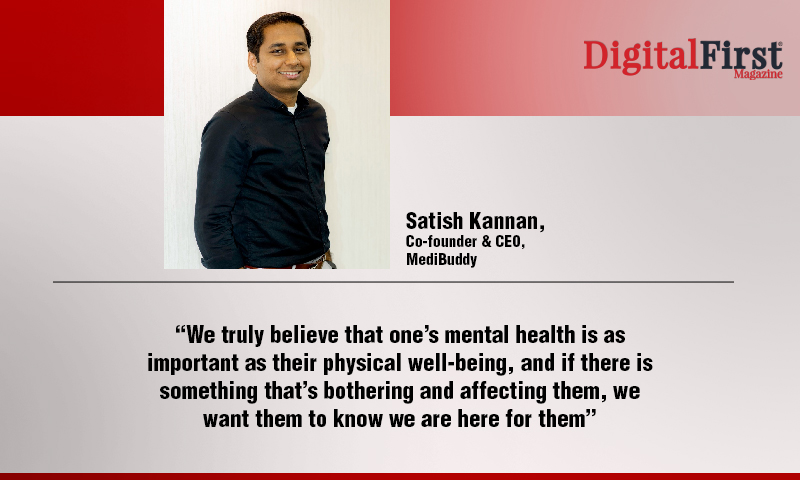
Rising concerns relating to health have been worrisome amongst young individuals and adults alike in the country for quite a while. The pandemic has only further escalated and triggered these issues, further causing a rise in the same. We warmly welcome the decision taken by the Honourable Finance Minister in the budget to set up a National Tele-Mental Health Programme, to support the mental health grievances of citizens across the country. It is a much-needed initiative that holds the potential to provide assistance and guidance to those who are suffering. We truly believe that one’s mental health is as important as their physical well-being, and if there is something that’s bothering and affecting them, we want them to know we are here for them. MediBuddy has been a pioneer in the industry at assisting individuals dealing with mental health issues. We have the teleconsultation infrastructure in place to tackle any health problems and are geared to extend our assistance in any way required to strengthen this initiative. We are confident this will aid in helping people who need support and timely care.
Khadim Batti, CEO & Co-Founder, Whatfix
This year’s budget has reiterated how the start-up ecosystem has been one of the key drivers of growth for our economy. The extension of one more year of the current tax incentives and other measures comes as a relief for startups. India’s start-up ecosystem has been witnessing tremendous growth and attracting attention from Venture Capitals and Private Equity players. 2021 saw a record of $42 billion investment from global and domestic players. The most recent Economic survey states that India currently has over 61,400 startups recognised by the Department for Promotion of Industry and Internal Trade (DPIIT) and the previous financial year 2020-21 saw an increase with addition of at least 14,000 recognised startups. India also witnessed the doubling of the unicorn club to 83 start-ups with 42 new ones.
With the focus on the start-up ecosystem, the budget has also called for an expert committee to examine and suggest appropriate measures in scaling up the investments from the VC/PE community. Such a move will streamline the investments in start-ups and provide greater benefits to employees. The start-up ecosystem is also getting capital gains exemption and extension in the eligibility for claiming tax holiday by one more year to 31 March 2023. Employees who join start-ups at the various stages of growth can avail more equity and less cash in terms of salary compensation. This will help the Indian start-up base continue to witness steady growth and a more promising talent pool.
A report published by CBInsights indicates that there are plenty of opportunities for industries in the technology services, fintech, mobile services, IT, and other sectors to achieve unicorn status. With this year’s budget measures, tax incentives and the continue unicorn wave in India, entrepreneurs are striving not to be the best in India, but to be the best in the world.
Akshat Jain, CTO & Co-founder, Cyware
Tax incentives and relaxation for startups were one of the most awaited announcements. The extension of one more year of the current tax incentives comes as a welcome respite for startups. It is important to understand how the ecosystem has been one of the key drivers of GDP and will continue to have an immense impact this year as well. Emerging economy companies raised a record $42 billion in global and domestic financing in 2021 and with the addition of 42 new companies to the unicorn club, there are 83 currently doubling the count.
Yesterday’s economic survey highlighted the remarkable growth of startups in India during the past six years, especially in the IT/knowledge-based sectors. With the tax incentives being extended, it will enable Indian startups to recover from the effects of the challenges of the ongoing Covid-19 Pandemic. The budget has emphasized accelerating and bringing back growth to overcome challenges faced in the past two years.
With the increased focus on digital infrastructure and digital economy, the need for secure cyberinfrastructure will become all the more important. The time to focus extensively on cybersecurity and the support needed for companies building ‘Collective Cyber Defense’ technologies is now. Considering the record number of cyberattacks and ransomware threats that India faced last year, wish the government expands and extends its focus on strengthening the cyber security infrastructure and empower companies that have been making continued strides in building these solutions.






